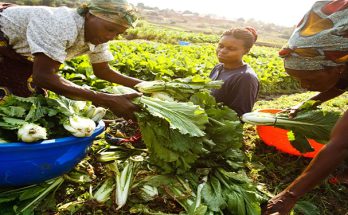 The African Development Bank (AfDB) has approved the participation of the Africa Fertilizer Financing Mechanism (AFFM) during a $4 million partial trade credit guarantee with OCP Africa, a subsidiary of the OCP Group. The project will reduce potential risks along the agricultural value chain, and improve access to quality inputs, including fertilizers, in Ivory Coast and Ghana.
The African Development Bank (AfDB) has approved the participation of the Africa Fertilizer Financing Mechanism (AFFM) during a $4 million partial trade credit guarantee with OCP Africa, a subsidiary of the OCP Group. The project will reduce potential risks along the agricultural value chain, and improve access to quality inputs, including fertilizers, in Ivory Coast and Ghana.
The three-year project (2020-2023) will support 430,000 smallholder farmers, including 104,000 women, within the 2 countries and facilitate their access to quality and affordable agricultural inputs, also as provide training in good agricultural practices.
The project will rest on OCP Africa’s Agribooster, an initiative that relies on an inclusive approach to provide farmers access to quality inputs, training, finance and market linkages for increased yields, incomes and livelihoods.
Activities are expected to boost productivity and help increase rice and maize yields by 35% in Ghana and rice yields by 30% in Ivory Coast . In light of these expected outcomes, OCP Africa and thus the AFFM will each contribute $2 million in trade credit guarantees.
Lahcen Ennahli, OCP Africa’s Senior president for West Africa , said: “The partnership with the African Development Bank will proportion and expand activities implemented under the Agribooster Initiative. We believe at OCP Africa that this initiative will function a model to further incentivize other private and development partners to enter into similar risk-sharing agreements which can have a positive multiplying effect on farmers, especially within the present context of COVID-19, which poses a big threat to their welfare also on food security, inputs and agricultural know-how.”
Director of Agriculture and Agro-industry at the African Development Bank, Martin Fregene Quoted, “To comprehend the increased agricultural productivity purpose of the Bank’s Feed Africa Strategy, The African Development Bank is gratified to associate with OCP Africa. This project aims to expand the access of modern farming inputs to smallholder famers with a result of increased productivity and promotion of agriculture towards a sustainable and profitable business in Africa.”
The project is in line with national development programs of the two countries. it’ll support the implementation of the national rice strategy in Ivory Coast , also because the Planting for Food and Jobs program in Ghana.
Coordinator of the Africa Fertilizer Financing Mechanism, Marie Claire Kalihangabo commented, “Africa Fertilizer Financing Mechanism (AFFM), as a result of this project is accomplishing its mission, comprising of providing African countries support in comprehending the target of the African Union of utilising fertilizer nutrients of minimum of 50kg per hectare on the African continent.”
“This project could also be a exemplar of partnerships needed to transform the lives of African farmers and help them transition from farming to agribusiness,” added Younes Addou, president Finance of OCP Africa.
The Africa Fertilizer Financing Mechanism (AFFM), was established by the 2006 Abuja Declaration. Through this Declaration, African unionist States committed to an initiative to reinforce agricultural productivity by providing financing required to boost fertilizer use in Africa to understand the target of fifty kg of nutrients per hectare. The AFFM is managed by the African Development Bank to accelerate agriculture development within the context of the Africa Food Security Vision, the Sustainable Development Goals and thus the African Union’s Agenda 2063.
Created in 2016, OCP Africa, a subsidiary of OCP Group, aims to contribute to the event of integrated agricultural ecosystems in Africa. OCP Africa works hand in hand with farmers to help grow the agricultural potential of the African continent through solutions adapted to local conditions and to the wants of soils and crops. In partnership with a network of partners, including governments, non-profit organizations, and corporations , OCP Africa works continuously to put in place all the specified conditions for the advantage of farmers. OCP Africa is present across many African countries through the opening of subsidiaries and/or representative offices (Côte d’Ivoire, Senegal, Cameroon, Kenya, Ghana, Nigeria, Zambia, Benin, Tanzania, Ethiopia, Burkina Faso , and Rwanda). it is also helping to secure the assembly of competitive fertilizers near major agricultural pools, to strengthen its logistical capacities and to develop new local distribution networks.



